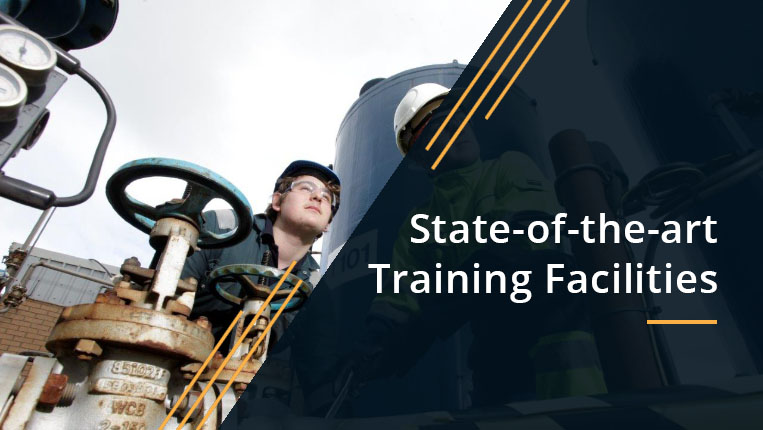How state-of-the-art training facilities are driving business growth in South Humber
4:05 pm, Thursday, 1st August 2019 - 5 years ago

From simulated naval emergencies to lectures direct from industry experts, here’s how world-class training and education facilities support North East Lincolnshire’s biggest business sectors.
Logistics and transport
In England, logistics operations are moving north from the Midlands area, and ecommerce growth means there’s more demand than ever for warehousing and fulfillment. That mean there’s a huge role for the South Humber area within the logistics sector, and local training providers are ensuring a steady supply of skilled labour.
One example is Immingham-based Modal Training, which combines hands-on industry experience with the academic breadth of the Grimsby Institute. Specialising in the offshore and logistics sectors, Modal’s work complements the Institute’s curriculum, but develops unique solutions for business clients based on their need – which requires flexibility in dynamic, high-growth industries. Its facilities include an LGV simulator facility, which recreates the cab of an LGV to allow training in emergency and severe weather conditions. One of Modal’s latest offerings is a driver apprenticeship programme, which was developed in response to high LGV driver demand.
CATCH is another organisation that offers simulated work environments, as well as being a conduit for relationships between organisations through its membership scheme. It works right across the careers lifecycle, from apprenticeship training for school leavers through to higher education and advanced skills. As a focal point for its members, CATCH allows training and regulatory briefing on themes such as health and safety to be delivered to multiple organisations at once.
Offshore renewables
It’s well known that offshore renewables is a huge growth area for South Humber. Names like Ørsted and E.ON are already committed to the area, and there’s promise of more investment to come.
Meeting the sector’s staffing needs requires robust training facilities, particularly since on-the-job training is often impractical. Fortunately, within North East Lincolnshire there are several on the doorstep. HOTA (Humber Offshore Training Association), an onshore, offshore and renewables training provider, offers specialist courses for wind turbine and renewable energy professionals, as well as training in complementary skills like maritime and health and safety.
The Ofsted ‘Outstanding’-rated Grimsby Institute is another key provider of offshore skills, mainly through the facilities at Modal Training. Modal’s unique maritime and industrial simulators include offshore vessel and control room environments that bring these potentially hazardous situations into a safe educational context.
At CATCH, trainees can study hands-on using a full-scale wind turbine nacelle, an environment not otherwise accessible without going out to sea. Their practical training offering sits alongside more generally applicable skills like personal development and health and safety.
At the higher education level, South Humber has strong links with the University of Hull, working with partners including Orsted, CATCH, Siemens, Humber LEP and the ORE Catapult. Projects including Aura help solve the technical and operational challenges facing offshore wind, and facilitate the development of the skills and expertise required by this rapidly growing industry. The three key areas of focus are to create a talent pipeline, engage with industry, and to undertake research, development and innovation programmes.
Food manufacturing
The ports of Grimsby and Immingham are home to some of the UK’s largest food processing facilities, and the area has a special connection to the seafood industry. Fresh food arrives by boat and plane, and must be expertly processed, packed and transported to consumers across the UK and abroad within tight timescales.
The Food Refrigeration and Process Engineering Research Centre (FRPERC) is part of the Grimsby Institute. Its work is focused on making sure that food is stored and processed in the most safe and efficient way possible, so it’s optimally fresh – and delicious – when it reaches the consumer. The FRPERC works closely with industry partners, offering short courses and workshops aimed at employees in factories and processing facilities, as well as bespoke training programmes.
Another key player is Seafish, a government-backed organization that supports the seafood industry. It offers training in fresh fish preparation and food safety, and also acts as a broker connecting businesses with other useful training providers.
Advanced manufacturing
From aircraft parts to electric cars, North East Lincolnshire is ideally placed for advanced manufacturing. As well as its transport connectivity – by road, rail, sea and air – and local power generation, it has a higher-than-average number of skilled workers in key advanced manufacturing categories living locally.
Central to developing advanced manufacturing skills and bringing new talent into the workforce is the Grimsby Institute, which offers HNCs, HNDs and diplomas in skills like welding and fabrication, mechanical engineering and electrical engineering, as well as support for a wide range of vocational skills.
Within 45 minutes’ drive, the University of Hull provides a complete range of undergraduate and post-graduate degrees in subjects like engineering, mechanical engineering, medical and energy engineering. It’s at the cutting edge of research, too, with scientists specialising in emerging areas like autonomous mechanics, robotics and future materials.
All of which is good news for industrial companies seeking the training and educational services required for sustainable business growth.